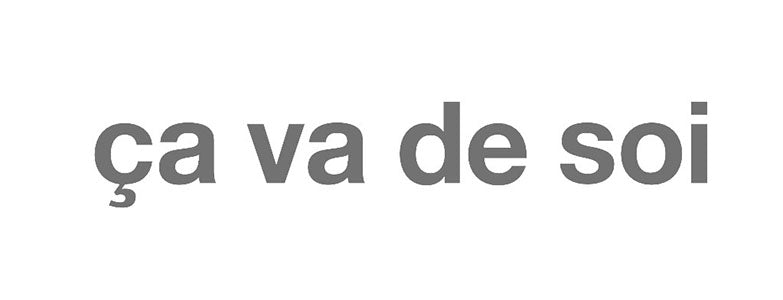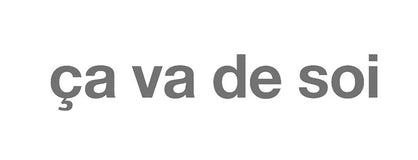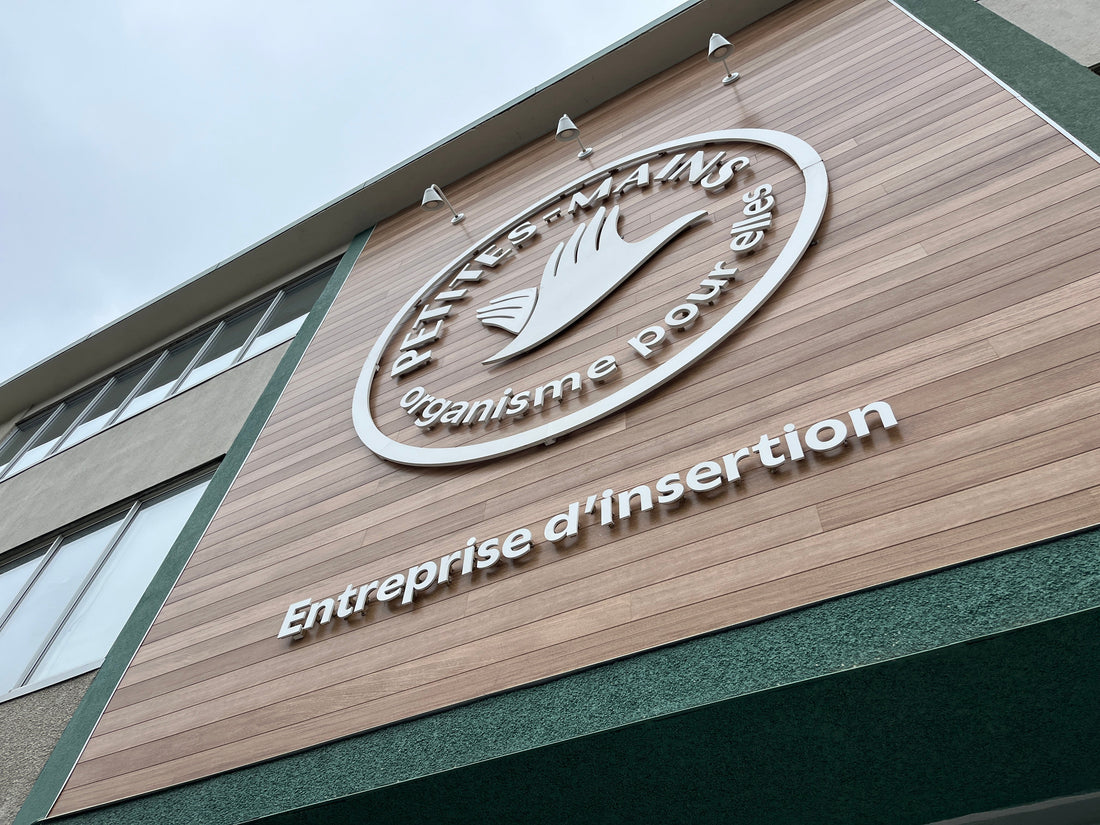A meeting with Petites Mains
"Alone we go faster. Together, we go further..."
It’s now been a year since ça va de soi began its collaboration with Petites Mains, a company that focuses on social integration.
A beautiful and committed partnership, from start to finish, led to the creation of our now-iconic tote bag: Tutti.
Today, I’d like to share through these interviews and portraits of men and women, what makes them also so symbolic of Montreal: a city that is enriched by the variety of cultures that are part of its social fabric and the encounters that are sown from all walks of life.
In the studious atmosphere found in the studio, I hear the humming of sewing machines... I catch the scent of new fabrics, lifting a fine dust visible in the shafts of light from the large bay windows...
My first meeting is with Mélissa, who knows Petites Mains well, having worked there for several years. She agreed to an interview, accompanied by her colleague Morgane.

• How long have you been working at Petites Mains?
– I’ve been working at Petites Mains for 7 years now. Before that, I was a specialized educator.
• What is your role?
– My role has several aspects: I train the support staff, plan the participants’ entries and exits from the programs, ensure any follow-ups, and organize various activities for our teams.
I work closely with Service Québec, which supports all the socio-professional training programs we offer.
In collaboration with each individual, we determine what suits them best, based on their personality, skill set, or existing knowledge in a given field, interests, or availability. We’re also careful to adapt to any specificities when it comes to single mothers, for example: women raising children alone and who need to pick them up from school, etc. Both the training and the future job schedule must be compatible with their needs right from the start.
We begin with an initial meeting, during which we get to know each other, and then we offer a place in one of our training programs.
The first four weeks are a trial and observation period. We gage what the person’s comfort level is, if they can self-reflect on their work: are they enjoying what they’re doing? Are they satisfied with the result of their work?
Through various self-assessment questions, we make sure that they have the potential to be independent in a long term in a position that may require great precision, attention to detail, patience, or speed of execution.

• Since when has Petites Mains existed?
– Petites Mains has existed since 1995. It started after the closure of a food bank that Ms. Aboumansour, who herself immigrated to Quebec a long time ago, along with Sister Denise Arseneault, realized the real need for support that the food bank had partially fulfilled for immigrants in Montreal. So, it was this duo who created Petites Mains.
• Where are your premises located, in which neighborhood?
– Initially located in Côte-des-Neiges from 1995 to 2006, Petites Mains is now based on Saint-Laurent Boulevard. This location is strategic, between Parc-Extension and Villeray, It is accessible by public transit and is in a bustling area that is essential for people who require easy access.
Also, we have a lot of space in our facilities. In 2006, it was also important for us to become owners of our space, to avoid the risk of being evicted, which unfortunately happens often in certain Montreal neighborhoods. Our organization needed to settle into a more sustainable and stable way of functioning.

Starting in 2007, a kitchen space was added, along with a catering service and a café that was already there, that has evolved quite a bit since its creation. It has become a very pleasant place.
The catering service has also grown significantly and is a real success. We now offer box lunches for businesses, for various public or private events, pastries, and more…


• Tell us about the social aspect of Petites Mains...
– We offer many workshops to support social integration, whether professional or for other purposes. These themed workshops address topics such as general health, women’s sexual health, culture shock, assistance with filling out official documents through Service Canada, domestic violence, psychosocial support, labor standards via the CNESST (rights and responsibilities of employers and employees), housing rights, the healthcare system, and even how to adopt a winning attitude to maintain a job in Quebec... All these workshops are extremely helpful.
In addition, we also organize more recreational activities: outings to the sugar shack, Halloween get-togethers, potluck lunches, dancing in Jarry Park… All cultures come together, everyone brings a dish from their country of origin to share, it’s lovely and really helps build connections.
• How does professional integration work, and who are the people who come to see you?
– We support people from the moment they arrive. We give them access to French-language workshops, alongside any specialized training through organizations like Littératie Ensemble or thanks to volunteers... Because of course, not everyone speaks the language. These classes are offered by the Ministry and are open to both men and women.
We see all kinds of profiles. Sometimes people have just arrived in the country, other times we may encounter people who now have more time, maybe because their children have grown up, who feel the desire to be useful, to find an activity that both motivates them and helps them stay connected to society. The average age of these people is between 40 and 45 years old.
Quite often, when a couple immigrates, the husband already has a job, and the mother takes care of the children: she remains the anchor point of the family’s original culture. Then, once the children have left the nest, the freed-up time allows the mother to consider taking up an activity.
But again, we see all types of situations, and we also work with many single mothers, for whom finding a job is a financial necessity and a top priority.

• On average, how long does the training last, and how do participants transition into other companies afterward?
– The training lasts 6 months and participants are paid minimum wage. The goal is for participants to be fully independent and confident by the time they complete the program.
When the final month of training arrives, we continue to support them by offering workshops that focus on writing a résumé, and we conduct mock job interviews and share our directory of companies where they can apply. We accompany each person throughout the entire process.
Anyone who truly wants to work, will find a job. The job placement rate following the training is around 80%.


• In which fields do you offer professional integration?
– We offer four different types of training programs: industrial sewing, kitchen assistance, office clerk, and front desk or reception.
There is quite a strong demand, and we have the capacity to welcome around 65 people per year. We have 2 spots per year for office clerks, around 10 for kitchen assistants, and 50 spots for the sewing workshop.
• What are your areas of expertise when it comes to textiles?
– We support a wide variety of clients, from receiving orders to full-scale manufacturing: printing, embroidery, and garment production. Each step is carried out in close collaboration with our partners.

We apply a standard base rate and are known for the excellent quality-to-price ratio of our work. With us, no thread is left hanging, every piece is meticulously made, with great attention to detail.
We operate with very little inventory, which allows us to be flexible and responsive. Every order is processed on a made-to-measure basis. The process always begins with a meeting with the client; some arrive with a clear idea, while others want to brainstorm the concept together.
• What equipment and expertise do you have? Any specific machines?
– Our studio is equipped with a wide range of industrial machines, professional-grade equipment that enables us to meet diverse needs while ensuring durable, neat, and high-quality construction.

Among them:
• the 3, 4, or 5-thread overlock machine, used to serge edges and assemble fabrics in a strong and neat way,
• the coverstitch machine, perfect for stretchy hems and finishing knitwear garments,
• the walking foot machine (feed dog sewing machine), essential for sewing thick materials like leather or canvas,
• the buttonhole machine, which makes clean and precise openings for buttons,
• and the bartack machine, used to reinforce stress points such as bag handles or belt loops.
• This variety of equipment allows us to combine manual know-how with industrial precision, while adapting our production to the specific requirements of each project.
• We make all kinds of garments and accessories: bags, t-shirts, polo shirts, scarves, and even toques (for example, for the Women’s March Worldwide).
Clients can choose from our catalog or propose a model for us to reproduce. The choice of textiles is always made in consultation with clients and with a focus on customization that is linked to our expertise.
• How many people work in the sewing workshop?
- We have eight permanent employees in our workshop, which ensures consistent quality, and currently 31 participants in socio-professional integration programs, who actively contribute to our production.

• What qualities are necessary to join the sewing workshop?
- Together with each person, we choose what suits them best, based on their personality, their skills or acquired knowledge from various areas, their affinities, or their availability… We are careful to remain flexible, especially when it involves a single mother raising children, who may need to pick them up from school, etc. The training and future job schedule must fit from the very beginning of this choice.
We start with a first meeting during which we get to know each other, then we offer a place in one of our training programs.
The first 4 weeks serve as a probationary, and observation period. We ask the person if they feel comfortable, if they feel they have a good capacity for self-analysis regarding their own work: do they enjoy what they do? Are they satisfied with the results of their work? Through different self-analysis questions, we ensure their ability to be independent in the long term, in the role. The necessary qualities required are therefore to be meticulous, detail-oriented, patient, or quick, in terms of execution.
Yes, the City of Montreal and Service Québec, among others, support our access to aid.
TGX (which owns Marshalls, Winners, etc.) is also one of our most valuable donors: they are very involved both financially and voluntarily.
We also have our own foundation, Petites Mains, created in 2017, which helps us raise funds.
• Do you have a positive anecdote or a touching story about someone who particularly marked you and later had a very successful professional career, someone talented at something...?
Yes, there have been many in 7 years... But I particularly remember one person, a single mother who arrived quite sad, head down, withdrawn ùyou could sense the difficulties she was facing raising her child alone.
As her culinary training progressed, I saw her lift her head, gain confidence, and I felt she was proud of what she was accomplishing. She was a very courageous, hardworking mother, always punctual, with a great team spirit, but always present for her child, whom she left in our daycare "Le Royaume"... Today, she has had a job for more than 2 years, and I recently learned she even received a promotion at her company, it’s a true success story. I am very proud of the path she has taken, partly thanks to Petites Mains and mostly thanks to herself!

Our conversation continues with Hélène, who introduces her team and talks to us about our project...
• Could you briefly describe the steps involved in designing a Tote Bag, such as the one made for ça va de soi?
- It was a genuine co-creation, a tailor-made project carried out in collaboration with their team. A prototype was carefully developed, down to the label placement, then approved before production began. In total, 500 bags were delivered last fall.
• What is its special feature or added value? How is it different from others?
For ça va de soi, the initial idea was to design an eco-friendly bag based on the SN04 model. From this model, we reduced the width, increased the height, added two inverted pockets, chose a simple design without printing, and finally… Added a small discreet label on the side, the touch of chic! The result: a high-quality, unique, durable bag that stays true to the ça va de soi image.
• What is the production timeline for a Tote Bag?
The project took about three months: the first meetings took place in the summer, and everything was finalized in September.
• How many people worked on making a Tote Bag?
Each bag passes through the hands of six women, each responsible for a different step in the process. All our products leave the workshop with a Petites Mains label, a mark of quality and commitment.
Our small tight-knit team is:
• Hélène (myself), responsible for sales and client relations,
• Béchara manages fabric measurements and cutting times,
• Natalie determines the number of seamstresses involved and the amount of thread needed and also ensures the final quality of our products. During inspection, every detail is checked to spot and correct any imperfections.
The production steps are clear:
• design → cutting → sewing → final inspection → packaging

Final cleaning of the bags.

Natalie, always smiling at her workstation.
* What is your strongest argument to encourage a brand to manufacture locally, even though production costs can sometimes be significant? What are you most proud of?
- Choosing Petites Mains means making an ethical, conscious choice. Choosing 100% local manufacturing also means supporting a human-centered, transparent production model that respects working conditions.
We know our prices may seem higher, but it is important to remember that our work is incomparable to low-cost productions from Asia. Each piece is made here, locally, in Montreal, by women whom we train and support in their socio-professional integration journey. Moreover, we work with small margins because we want to remain accessible.
Also, our access to raw materials is limited. We source only from local suppliers in Montreal, Toronto, and sometimes even Vancouver. Since the pandemic, stocks—especially of colored fabrics—have decreased with our suppliers, forcing us to be very responsive: first come, first served.
Finally, choosing Petites Mains means choosing a durable product: for printing, the screen printing is done with water-based inks, which are more ecological and better absorbed by fibers than Plastisol inks, which are usually more toxic.

The patterns for all ongoing projects.



We really thought about its shape and dimensions with a practical and useful purpose in mind. Its large capacity and sturdiness make it a reliable companion for all occasions. Our Tote Bag is designed to hold a bottle or water flask upright and within easy reach. Equipped with a large inner pocket, you can slip your phone in without worrying it will get lost at the bottom of the bag...

If you wish to get Tutti, visit here or come to our store : Tutti
Today, thanks to the connection we have built with Petites Mains, we are proud to have integrated Asra, who has been with ça va de soi for a few months now.

Asra, at our knitwear spa çava bain, located on Greene Avenue.


